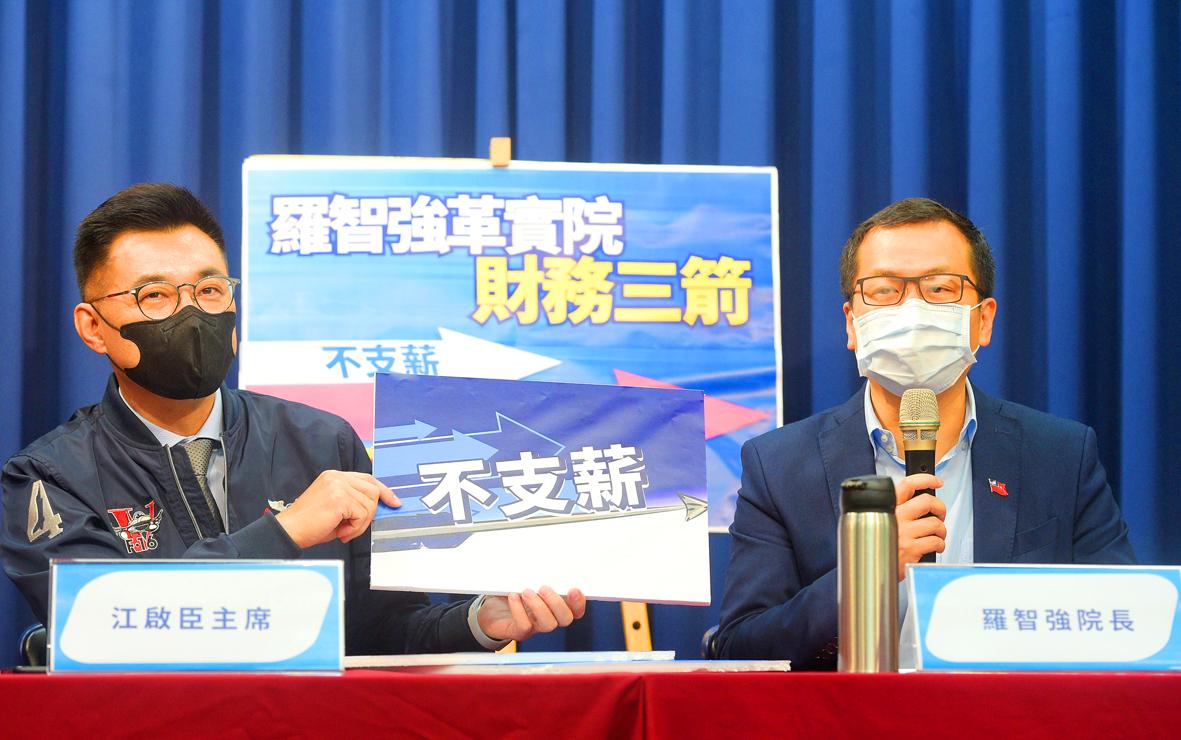Chinese Nationalist Party (KMT) Chairman Johnny Chiang (江啟臣) yesterday said that he hopes the party’s Institute of Revolutionary Practice could become an “important cradle” for attracting and cultivating party talent.
“Although the KMT is poor, it cannot be poor in the area of cultivating talent because talent and discourse are the KMT’s most important assets in the future,” Chiang said at a news conference at the party’s Taipei headquarters to mark Taipei City Councilor Lo Chih-chiang (羅智強) taking over as the institute’s new director, along with deputy directors Yu Shu-hui (游淑慧) and Huang Chien-hao (黃健豪).
The party must show the public through action, not just words, that it wants to develop new talent, he added.

Photo: Chang Chia-ming, Taipei Times
Lo outlined his three major policies for the institute, which has reverted to its original name from the National Development Institute.
He said that he would not take a salary for being its director, although Chiang had told him that the job was an “obligatory post” that came without pay when he offered it to him.
“The KMT is at a historic low point,” Lo said. “The institute has no money and neither does the KMT.”
Lo said he would keep the promise that he made on Jan. 12, the day after the presidential and legislative elections, to donate NT$800,000 (US$26,532) to the KMT’s youth development work once a new party chairperson was elected.
The donation would be made to the institute to help pay its expenses, he said.
Furthermore, the institute is to launch a NT$10 million fundraising drive, he said, adding that details would be released as soon as possible.
While NT$10 million is a small sum for the Democratic Progressive Party (DPP), whose resources are “endless,” it is an “astronomical amount” for the KMT, he added.
For decades the KMT had a reputation as one of the wealthiest political parties in the world.
In July 2018, Ministry of Interior data showed that the KMT had assets totaling NT$18.9 billion (US$626.82 million), while the DPP had assets worth NT$769 million, the Liberty Times (the Taipei Times’ sister newspaper) reported.
However, on Dec. 6 last year, the KMT said it was struggling to pay staff, due to an asset freeze imposed by the Ill-gotten Party Assets Settlement Committee.
The committee said that the KMT had income of NT$420 million in 2018 that had not been frozen.
Additional reporting by staff writer

Taiwan is stepping up plans to create self-sufficient supply chains for combat drones and increase foreign orders from the US to counter China’s numerical superiority, a defense official said on Saturday. Commenting on condition of anonymity, the official said the nation’s armed forces are in agreement with US Admiral Samuel Paparo’s assessment that Taiwan’s military must be prepared to turn the nation’s waters into a “hellscape” for the Chinese People’s Liberation Army (PLA). Paparo, the commander of the US Indo-Pacific Command, reiterated the concept during a Congressional hearing in Washington on Wednesday. He first coined the term in a security conference last

Prosecutors today declined to say who was questioned regarding alleged forgery on petitions to recall Democratic Progressive Party (DPP) legislators, after Chinese-language media earlier reported that members of the Chinese Nationalist Party (KMT) Youth League were brought in for questioning. The Ministry of Justice Investigation Bureau confirmed that two people had been questioned, but did not disclose any further information about the ongoing investigation. KMT Youth League members Lee Hsiao-liang (李孝亮) and Liu Szu-yin (劉思吟) — who are leading the effort to recall DPP caucus chief executive Rosalia Wu (吳思瑤) and Legislator Wu Pei-yi (吳沛憶) — both posted on Facebook saying: “I

The Ministry of Economic Affairs has fined Taobao NT$1.2 million (US$36,912) for advertisements that exceed its approved business scope, requiring the Chinese e-commerce platform to make corrections in the first half of this year or its license may be revoked. Lawmakers have called for stricter enforcement of Chinese e-commerce platforms and measures to prevent China from laundering its goods through Taiwan in response to US President Donald Trump’s heavy tariffs on China. The Legislative Yuan’s Finance Committee met today to discuss policies to prevent China from dumping goods in Taiwan, inviting government agencies to report. Democratic Progressive Party Legislator Kuo Kuo-wen (郭國文) said

The Ministry of Economic Affairs has fined Taobao NT$1.2 million (US$36,900) for advertisements that exceeded its approved business scope and ordered the Chinese e-commerce platform to make corrections in the first half of this year or its license would be revoked. Lawmakers have called for stricter supervision of Chinese e-commerce platforms and more stringent measures to prevent China from laundering its goods through Taiwan as US President Donald Trump’s administration cracks down on origin laundering. The legislature’s Finance Committee yesterday met to discuss policies to prevent China from dumping goods in Taiwan, inviting government agencies to report on the matter. Democratic Progressive Party